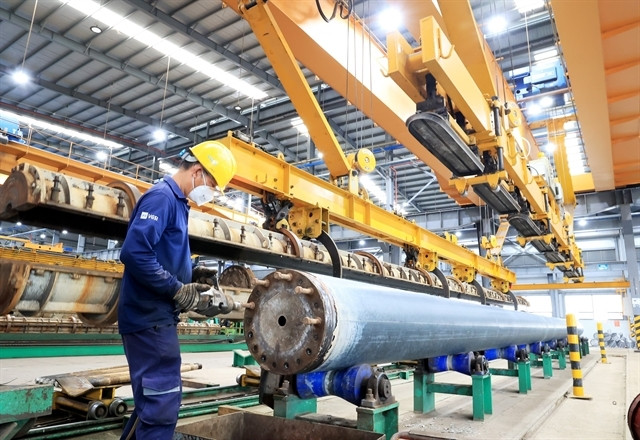 |
| A worker performs product inspection at an FDI factory in the southern province of Bà Rịa-Vũng Tàu. VNA/VNS Photo |
During a meeting with Prime Minister Phạm Minh Chính last week in Hà Nội, Samsung's financial director Park Hark Kyu said the number of Vietnamese suppliers working with Samsung has increased to 309 this year, 12 times the number recorded in 2014.
The world's largest phone maker has recently reaffirmed that it will continue to invest US$1 billion annually with one of the objectives to increase the number of Vietnamese partners participating in the supply chain and enhance cooperation in worker training.
To date, Việt Nam has become home to most of South Korea's major firms including Samsung, LG Electronics, Hyundai, CJ, Lotte, SK, SHINHAN, Namyang and Hanwha. South Korea has been Việt Nam's largest investor with massive projects underway and strong expectations of a new wave of South Korea's investment landing in the country.
Meanwhile, the year 2023 saw significant growth in foreign direct investment (FDI) inflows into Việt Nam including Japan's Thái Bình LNG Power Plant project with a registered investment capital of $1.99 billion, Hong Kong's JINKO SOLAR HAI HA Vietnam (JINKO SOLAR HẢI HÀ Việt Nam) project with a registered investment capital of $1.5 billion, LITE-ON Quảng Ninh Factory project with a total investment capital of $690 million, and South Korea's LG INNOTEK Hải Phòng Factory project with an additional investment of $1 billion.
A recent survey by the Vietnam Chamber of Commerce and Industry (VCCI) showed strong optimism regarding the role of Vietnamese suppliers in FDI businesses, showcasing domestic companies' potential to further integrate into the global supply chain.
The chamber said the optimism was the continuation of a trend, observed over the year as FDI businesses have become increasingly dependent on domestic suppliers over the past time, increasing from 63.32 per cent in 2022 to 75 per cent in 2023.
VCCI said the government's measures to improve links between FDI businesses and Vietnamese suppliers have started to show results.
"Higher dependency on domestic suppliers is another indicator of FDI businesses are looking to buy from domestic sources to minimise the negative impact of heightened US-China trade tension," said the chamber.
However, businesses said more must be done to improve Việt Nam's supply chain.
Trương Thiệu Cường, director of a display equipment trading company based in China, said Việt Nam lacks an ecosystem that strengthens its suppliers. For example, in China, there is an established ecosystem that covers all aspects of product development and commercialisation such as design, material input and mass production, which accelerates production, seizes new opportunities, as well as product sales and value.
"As Việt Nam relies heavily on importing raw materials, costs are significantly higher compared to China," he said.
However, he said Việt Nam also enjoys numerous advantages such as vast land fund, dense population and a wide range of natural resources. Government policies must be implemented to improve Việt Nam's supply chain to attract foreign investors. Meanwhile, investments should be made to train additional skilled workers for future development.
Many businesses say advanced technology is the key to producing high-quality products at lower costs. They stressed the importance of mastering the technologies being transferred as parts of FDI projects, especially in the high-tech sector.
They urge the government to study and adopt additional policies to help domestic companies in the global value chain. — VNS